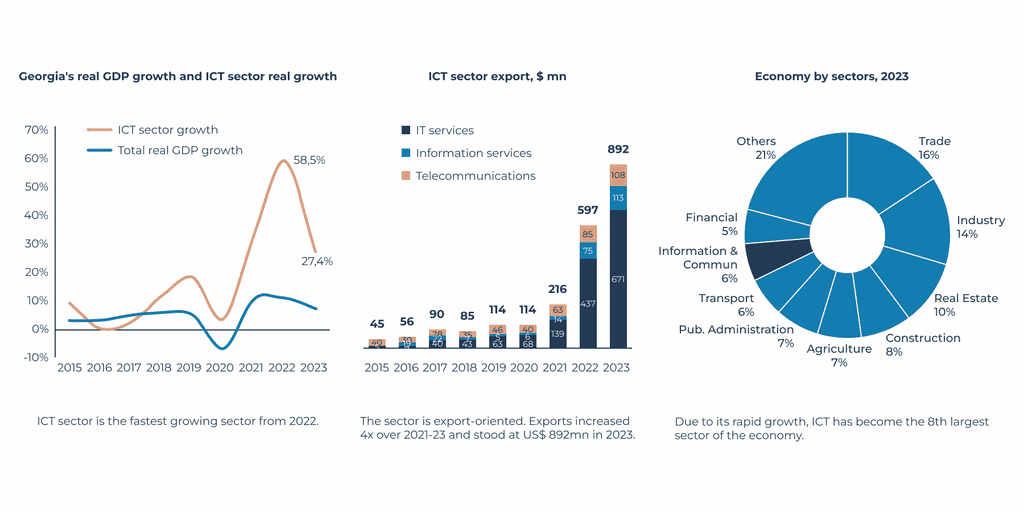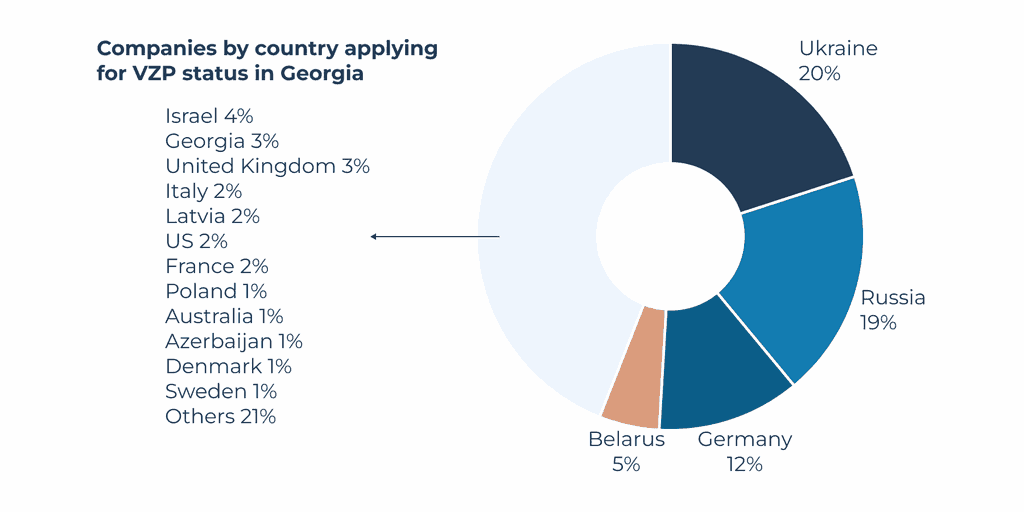Would you believe Georgia exported more software in 2023 than wine: USD 892 million to USD 259 million? Information and communication technologies (ICT) is the fastest growing sector in the country. The number of employees in the sector has grown tenfold, from 3,000 to 30,000 over the past five years, and according to Galt & Taggart, there are more than 24,000 companies. And guess who’s buying the technology: the US (26%), the UK (15%), Malta (11%), the Netherlands (9%), and Germany (8%) (to name a few).
Thank Georgia’s tax legislation for IT companies – you can reduce the tax burden to almost 0% (with some reservations) if you register in a virtual zone.
What is a Georgian virtual zone?
The concept itself is introduced in the Law on Information Technology Zones, in force since 2011. Certain nuances are specified in other acts and resolutions, as well as the methodological instructions of the Revenue Service dated December 29, 2022.
In simplified terms, the status of Virtual Zone Person (VZP) is a kind of license that can be obtained by a legal entity developing IT products in Georgia. The certificate of inclusion in the virtual zone is issued by one of the subdivisions of the Ministry of Finance – LEPL Financial Analytical Service, and the status is valid indefinitely (you apply to waive the status or the tax authorities come to suspect you of tax evasion).
And you don’t need to be a resident of Georgia to obtain the status. If the business is based in the country, it can be managed from anywhere.

Tax benefits for virtual zone participants
Now here’s the but: the special tax regime is only for software exports. If you’re selling to someone outside Georgia:
- Corporate income tax (CIT) is 0%. If your customer is in Georgia, the rate is 15%.
- Value Added Tax (VAT) is 0% instead of 18%. Virtual zone members retain the right to register as a VAT payer, and you can receive a tax deduction when purchasing goods from other VAT payers registered in Georgia.
- Members of the virtual zone are also exempt from export duty.
IT companies still need to pay:
- 20% income tax on employee salaries in Georgia (plus mandatory pension contributions under the 2+2% model). However, in theory, a company may employ at least part of its staff in other countries.
- Tax on dividends, if there are any, is 5%. Georgia has signed bilateral double taxation agreements with 58 countries, including the UAE, Saudi Arabia, India, Kuwait, and Hong Kong. The tax burden can be reduced for shareholders registered in these jurisdictions.
Qualifying for VZP status
There aren’t many hoops to jump through:
- You have to be an IT company (what that means is coming up).
- You must have a registered business in Georgia (linked to a Georgian phone number and a corporate account in a local bank). There are no capital or residency requirements for owners – there may be no capital at the initial stage, and the business can be owned by a foreign national.
- You must do business in Georgia. The easiest way to confirm this is by showing that you actually employ staff in the country and have an office where they work. There are other options for personnel, though. For example, in some cases you may be able to limit yourself to contractors in Georgia, but opening an office helps get your application approved.
If you meet the requirements, apply to become a member of the virtual zone. Please note that regulators evaluate each application independently, so a lot depends on how you present your case.
PB Services’ specialists can handle the legal stuff for you, open a Georgian company, corporate bank accounts (including remotely), get your accounting and HR documents in order, register your company in a virtual zone, and help reduce your tax burden. Book a free 30-minute consultation in English, Georgian, Russian, or Arabic to find out more.
Revenue Service classification as an IT company
The Virtual Areas Act itself defines information technology as the activity of “researching, maintaining, developing, designing, manufacturing, and implementing computer systems that result in software products.”
Because that definition leaves a bit to be desired, the Revenue Service follows a more precise description from the “Law of Georgia on Copyright and Related Rights,” which defines a computer program as “a set of instructions expressed in words, codes, chips, or other machine-readable format that allows a computer to achieve certain results” (essentially equating the terms “computer program” and “software”).
Formally, organizations with the following NACE codes (Georgia follows the classification of the European Economic Community) can apply for inclusion in the virtual zone:
- J58 – Publishing activities in terms of electronic programs such as computer games (J58.2.1)
- J62 – Computer programming, consulting, related fields
- J63 – Information services activities, including data processing and web portal operations
- M73 – Advertising and market research
Other codes may also do – there are no legal restrictions. If a company cannot decide whether its activities relate to software development, the Revenue Service advises taking into account the general purpose of the activities. If they lead to the creation of IT products, you’re in.
Important clarification on software licensing
It follows from the final clarifications of the Revenue Service that developers who profit from licensed software created before registration as a participant of the virtual zone can claim tax benefits. In other words, you don’t need to create a software product from scratch from behind a desk in Georgia.

How long does it take to register in a virtual zone?
If you don’t have a company in Georgia yet, don’t fret – the whole procedure takes about a month. If you do have a company, it takes 12 days. This is an important advantage. In fact, you can apply for the virtual zone immediately after opening a new LLC. For comparison, an organization must have been operating in Georgia for at least 2 years to qualify for International Company status and benefits similar to what we’re talking about here.
The process will look like this:
- Open an LLC – up to two days. Bring your documents to the Justice House and apply (15 minutes). We have written about this in detail in a separate article.
- Register your LLC on the Revenue Service portal – one day.
- Submit an electronic application (should contain company information, description of services, and a list of IT projects) to the Financial and Analytical Service for inclusion in the virtual zone. Usually 10 days to process (but can take longer).
- Provide additional documents, if required. For example, the service may request proof of your economic presence in Georgia – another 10 days to review the new documents.
- Open your arms and receive your virtual zonestatus. If the application is approved, you can expect your electronic certificate within two days.
What are the chances of being denied Virtual Zone Person status?
Although the Ministry of Finance does not publish exact statistics on refusals, the number of registrations in the virtual zone is growing, if slowly, along with benefits for the Georgian budget. As of 2024, 1,275 companies had received VZP status. This may not seem like a lot for an initiative that’s been around for over 10 years, but the Asian Development Bank says the reason is probably that startups just don’t know the option’s out there. We think the chances of being denied are slim if you meet all the requirements and the application is submitted correctly – Georgia is extremely interested in developing the national IT sector. You know, almost half of all American unicorn startups are founded by immigrants…
As part of your free consultation, PB Services’ lawyers can take a look at your case and suggest the best way to reduce your tax burden, after all, the virtual zone is not the only option – you can get International Company status, and if you produce goods outside the IT sector, you can join one of four free industrial zones. If you are working as a freelancer (or a lone funder), we can also help you obtain status as an individual entrepreneur in Georgia. Drop us a line – what have you got to lose besides your excess tax?
